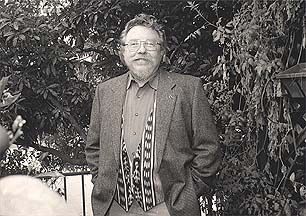
Lynlär's Tree House, 1993

Lynlär's Tree House, 1993
From the Introduction. "Earth and Its Inhabitants."
The Definitive History of the Universe. Vol.
XXVII, Chapter 9.
| To the end their confusion remained
both fundamental and literal. they insisted that what they thought they saw and heard
actually existed and was being spoken, that what they believed to be true was in fact
TRUE. Something within them, deep within the very heart of their culture, demanded a
consistency that we know does not exist. From age to age, from generation to generation, from day to day, they forcibly elevated these transitory beliefs to absolutes. Without doubt, the cause of all this can be found in their fundamental alienation and the personal insecurity that alienation bred. Their predicament required them to grasp onto and seize with a conviction -- both as laughable as it was pitiful -- certain attitudes and beliefs, relative truths, which pacified their immediate fear of living . . . of life and of being. Ah, but the pacification lasted only as long as the relative truths. And closer and closer toward the end, these temporizing truths and beliefs lasted for shorter and shorter periods of time. Nevertheless, and perhaps because of the dimly perceived immediacy of the end, these temporizers, these psychic and ideological tranquilizers, were even more firmly and fiercely fastened upon and proclaimed. And the few, the most very few, who did see, and who took the time to share their vision . . . who attempted to break the others loose from the immediate and from the false, destructive security of the literal, these few met with increasing resistance. To all attempts to expose the fundamental fallacy of the prevailing life destructive value system . , . to all attempts to strip away the individualized and personally created protectiveness . . . the answer was almost always and almost everywhere the same. "I am what I believe. And what I now -- this life, this instant -- believe is what I am right now -- this life, this instant. Therefore, any idea that threatens my belief system threatens my very existence." With sorrow and with increasing self pity for their own weakness in the growing intellectual darkness, the criers from within and the disturbers from without shrieked louder and louder. Answered by an equally louder and louder negation . . . a negation sometimes articulated out of angered anguish and fear, but more often affirmed by an indifferent silence. A silence that harbinged the end all undoubtedly dimly felt but refused to confront. So the two sides fought to the end. And to that end, they fought the wrong struggle, for they could be no other than what they were. As most of their existence had been, the concluding combat was also without meaning. For what would it have mattered had they consciously perceived the reality all about them? The lateness of their hour precluded any action that might have altered the conclusion of their TRIP. And so they tripped . . . to the end. But fault them not . . . neither the one side, nor the other, for we have not lived their lives in their times, in their places, under their conditions. Thus the universe, as we have learned, was not the world they perceived. And remember, as they perceived, so they lived. And in so living, they died . . . perished, to pass into and onto the pages of this history of their space and time. The knowledge and the understanding of their predicament, as our own may someday be recorded, establishes an essential fellowship with them. And that sense of fellowship is the reason for the pages that follow. |
| --- eelynlar |
|---|